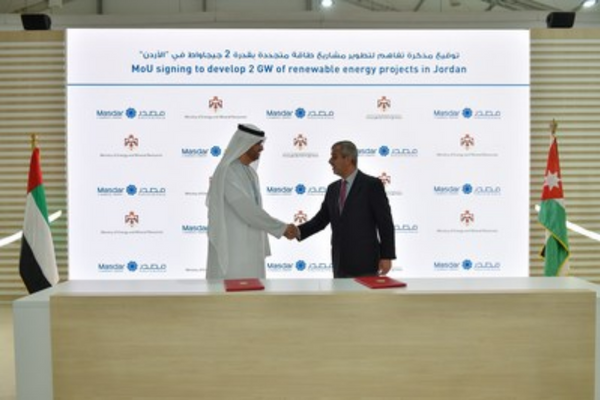Masdar Clean Energy, the top renewable energy business in the UAE, has declared that it has signed an MoU with Jordan’s Ministry of Energy and Mineral Resources to examine working together on renewable energy projects with a maximum capacity of 2GW.
At a ceremony held in conjunction with the 2022 United Nations Climate Change Conference, His Excellency Dr. Sultan Al Jaber, Minister of Industry and Advanced Technology, Special Envoy for Climate Change, and Chairman of Masdar, and His Excellency Dr. Saleh Al-Kharabsheh, Minister of Energy and Mineral Resources, signed the Memorandum of Understanding (COP27).
According to the MoU, the two parties shall investigate the creation and financial support of renewable energy projects in the Hashemite Kingdom of Jordan with a maximum of 2 GW of production capacity. The memorandum also covers the sharing of skills and knowledge in the fields of infrastructure development and renewable energy, including the transformation, distribution, and exporting of power.
Masdar’s Chief Executive Officer, Mohamed Jameel Al Ramahi, said, “For almost ten years, Masdar has been a proud partner of Jordan, assisting in the implementation of ground-breaking renewable energy projects that promote the sustainable growth of the nation. By signing this most recent Memorandum of Understanding, we intend to strengthen and broaden our cooperation with Jordan in the field of renewable energy.”
Through the MoU, Masdar might greatly expand its current footprint of two significant renewable energy facilities in Jordan. The Tafila Wind Farm in Jordan, the region’s first commercial utility-scale wind power plant, was completed in 2015 by Masdar. The 117 MW wind farm brought a 3% boost to the nation’s overall power capacity.
The 200 MW Baynouna project, the biggest solar energy plant in Jordan and located east of Amman, was developed and co-led by Masdar. Since 2020, the project has been able to replace an estimated 360,000 tonnes of carbon dioxide annually while providing the annual energy demands of about 160,000 houses. It produces 563 gigawatt-hours (GWh) of power annually, which is equal to 4% of Jordan’s total energy consumption.


